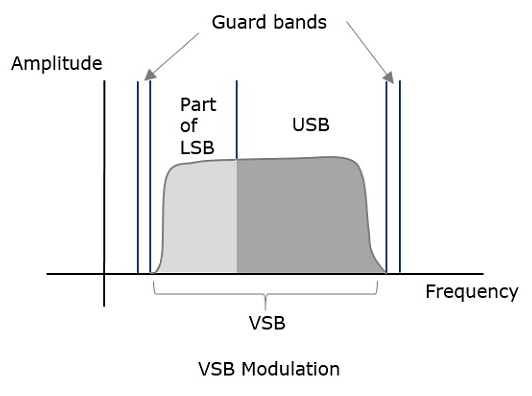In case of SSB modulation, when a sideband is passed through the filters, the band pass filter may not work perfectly in practice. As a result of which, some of the information may get lost.
Hence to avoid this loss, a technique is chosen, which is a compromise between DSB-SC and SSB, called as Vestigial Sideband (VSB) technique. The word vestige which means “a part” from which the name is derived.
Vestigial Sideband
Both of the sidebands are not required for the transmission, as it is a waste. But a single band if transmitted, leads to loss of information. Hence, this technique has evolved.
Vestigial Sideband Modulation or VSB Modulation is the process where a part of the signal called as vestige is modulated, along with one sideband. A VSB signal can be plotted as shown in the following figure.

Along with the upper sideband, a part of the lower sideband is also being transmitted in this technique. A guard band of very small width is laid on either side of VSB in order to avoid the interferences. VSB modulation is mostly used in television transmissions.
Transmission Bandwidth
The transmission bandwidth of VSB modulated wave is represented as −
$$B=( f_{m}+ f_{v}) Hz$$
Where,
fm = Message bandwidth
fv = Width of the vestigial sideband
VSB Modulation − Advantages
Following are the advantages of VSB −
-
Highly efficient.
-
Reduction in bandwidth.
-
Filter design is easy as high accuracy is not needed.
-
The transmission of low frequency components is possible, without difficulty.
-
Possesses good phase characteristics.
VSB Modulation − Disadvantages
Following are the disadvantages of VSB −
-
Bandwidth when compared to SSB is greater.
-
Demodulation is complex.
VSB Modulation − Application
The most prominent and standard application of VSB is for the transmission of television signals. Also, this is the most convenient and efficient technique when bandwidth usage is considered.
Learning working make money